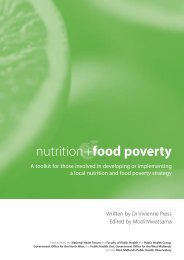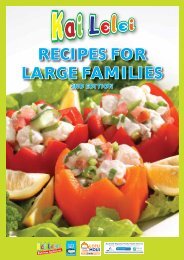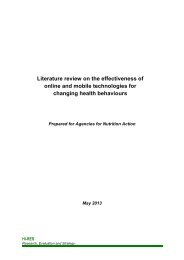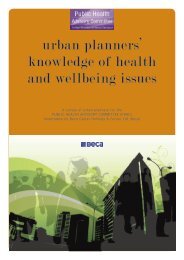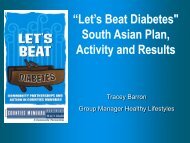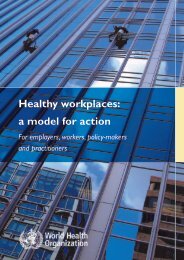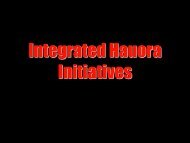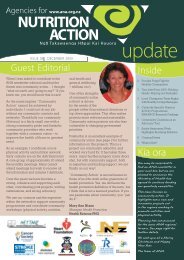enhancing food security and physical activity for maori, pacific and ...
enhancing food security and physical activity for maori, pacific and ...
enhancing food security and physical activity for maori, pacific and ...
- No tags were found...
You also want an ePaper? Increase the reach of your titles
YUMPU automatically turns print PDFs into web optimized ePapers that Google loves.
Enhancing Food Security <strong>and</strong> Physical Activity <strong>for</strong> Māori, Pacific <strong>and</strong> Low-income Peoplesensure inequalities were not increased. Potential side-effects could include positiveoutcomes in other areas such as health, education <strong>and</strong> employment. Marae-basedprogrammes could increase the number of people connected with their marae.Acceptability to stakeholdersOne in<strong>for</strong>mant commented that the programmes would be acceptable if people saw thebenefits of participation. Another stressed the importance of acceptability to Māoristakeholders.ConclusionCapacity development is an essential component of culturally-specific <strong>physical</strong> <strong>activity</strong>programmes. A variety of approaches <strong>and</strong> recommendations <strong>for</strong> developing capacityexist. Many of these have focused on developing capacity in health care workers indeveloping countries or among indigneous populations. Despite this, there are numberof consistent themes that were highlighted through the New Zeal<strong>and</strong> environmental scan<strong>and</strong> key in<strong>for</strong>mant interviews.From an action-focused perspective, six ‘capacity-building factors’ have been highlightedthat need to be considered <strong>for</strong> developing capacity:1. A collaborative approach based on a community development model. This wouldneed to take into consideration a Māori <strong>for</strong> Māori or Pacific <strong>for</strong> Pacific deliveryapproach <strong>and</strong> the Treaty principles.2. The presence of suitable expertise to facilitate mentoring strategies.3. Education <strong>and</strong> training <strong>for</strong> those delivering programmes, ideally linked withqualifications <strong>and</strong> a career pathway, which is extended into the communityparticularly to the voluntary work<strong>for</strong>ce.4 Development of champions <strong>and</strong> leadership actions, with Māori <strong>and</strong> Pacificrepresentation on advisory boards, <strong>and</strong> governing bodies where funding prioritiesare determined or funding decisions are made. This would include all areaswhere capacity development funding is available.5. Increase of resources to ensure basic infrastructure is available.6. Need <strong>for</strong> sources of funding to be available <strong>and</strong> accessible <strong>for</strong> Māori <strong>and</strong> Pacificpeople to ensure sustainability of any initiatives.There have been few evaluations of the effectiveness of developing capacityapproaches. Most have used surveys or qualitative approaches, but have not providedquantitative data regarding the success of capacity building strategies.Some of the six factors listed above, such as education <strong>and</strong> training <strong>for</strong> those deliveringprogrammes, will be programme specific actions. Others, such as championing Māori<strong>and</strong> Pacific representation on advisory boards <strong>and</strong> governing bodies, will be morestrategic than ongoing activities. It is not clear where leadership <strong>for</strong> such policydevelopment work would be located. There is, however, clear cross-over with both theHealth <strong>and</strong> Disability NGO Working Group(http://www.ngo.health.govt.nz/moh.nsf/indexcm/ngo-aboutus?Open&m_id=3) <strong>and</strong> thecapacity building with work undertaken by the Office <strong>for</strong> the Community <strong>and</strong> VoluntarySector (http://www.goodpracticefunding.govt.nz). There is also likely to be cross-over165



